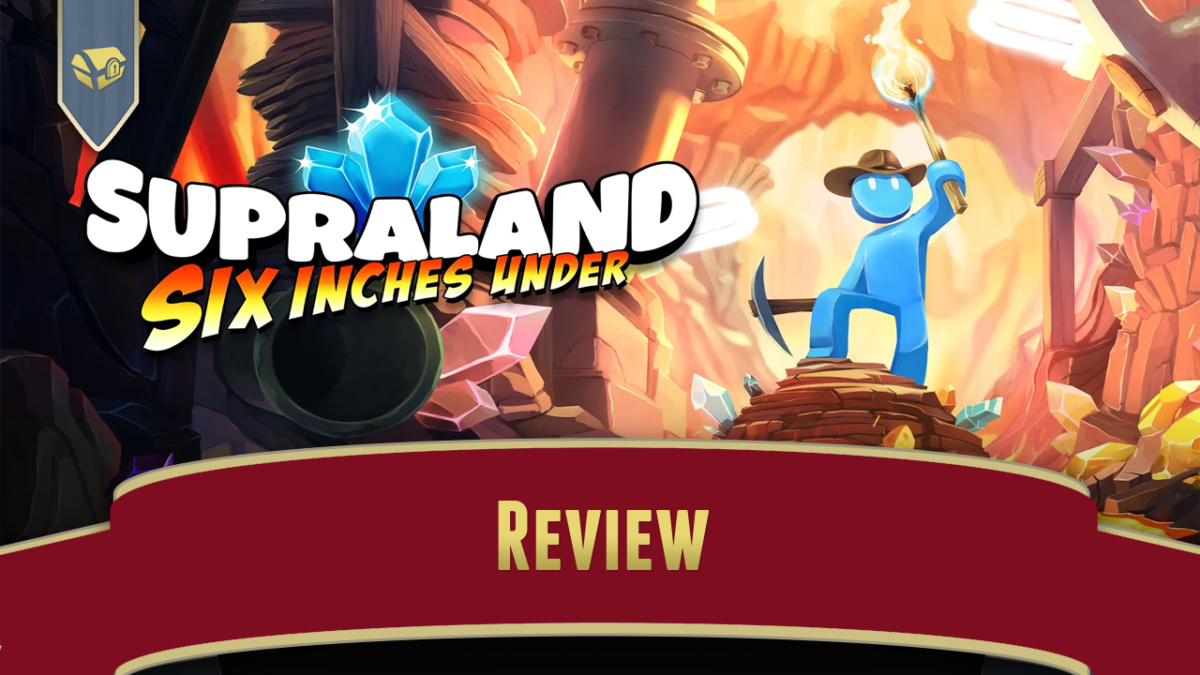A video review of Supraland Six Inches Under played with a gamespass key.
The Rogue Archive
Hello everyone, I’m back! Today’s find is an archive of old versions of Rogue!

While there were games with aspects of Rogue before it conquered university Unix systems, like Beneath Apple Manor, Rogue still deserves its status as the namesake of the roguelikes. Its great popularity on campuses inspired a slew of expansions and variations.
The world of early roguelikes wavers in its documentation and preservation. There’s several early roguelikes that are nearly unplayable today: the Roguelike Restoration Project (their site appears to have returned to the internet in 2022) has tried to preserve them but its manager has time constraints. I know that Herb Chong, who created a variant called UltraRogue, is still around, and has expressed interest in getting the code running again, but it’s a difficult project, not the least reason for being that the original game saved games by creating and reloading raw chunks of memory. (Roguelike Restoration Project put the original source up here if anyone wants to take a crack at it.)
Several versions of UltraRogue, as well as many versions of Rogue, Advanced Rogue, Super Rogue, XRogue, and others, can be found on The Rogue Archive. Playing some of them might be difficult, but the code is there, sometimes in object form, sometimes as source. It preserves the code for Rog-O-Matic, the computer program that, itself, plays Rogue. You can even find more obscure variations of Rogue there, like HexRogue (which has become unplayable on its home site since Java support for browsers was abandoned), zRogue (an implementation for the Infocom zMachine), PalmOS versions, something called Advanced SuperTurbo Rogue Plus, and more.
I’ve always maintained my affection for Rogue, even if in the eyes of many it’s deficient in features these days. But that means it’s short, it won’t consume weeks of your free time to finish it, while it’s also complex enough to maintain interest, and challenging enough that it’ll take a while to master. If, in this Year of our Frog 2024, you haven’t tried Rogue yet, well, why not? You’ll probably die, but in the end, that’s better odds than real life!
Sundry Sunday: The Balatro Theme With Mother 3 Instruments
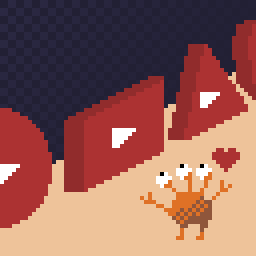
Sundry Sunday is our weekly feature of fun gaming culture finds and videos, from across the years and even decades.
Prepare to get the Balatro music stuck in your head all over again, but with the Mother 3 “soundfont,” a word that I’m not thrilled with. I don’t hate it, it’s just that there’s already good ways to refer to that concept, like “instrument set.” Ah. Oh well. Anyway. Here it is. (4 minutes – wait, the Balatro music is only four minutes long?)
A Note _For_ The Editor
@rodneylives, stalwart editor for the entirety of Set Side B’s existence is in a bad spot- stuck due to Hurricane Helene and suffering a bad car accident that thankfully saw no casualties but likely many other expenses. Myself and the other posters will do our best to fill in the while the editor recovers, but if you have a couple dollars we’d really appreciate it if you sent them his way in what is a really hard time. Here’s how you can do that:
- Cash.app: $rodneylives
- PayPal: @rodneylives
Thanks, and stay safe out there everyone.
Twinbeard Finishes Every Goal of Super Mario World
I had a car accident last night, and while it could have been much worse in retrospect, I’m still pretty shaken. So for today, let’s just relax and watch Twinbeard, who had been playing through every level and finding every goal, finally reach the end of Super Mario World. (18 minutes) Whew.
Nicole Express on Twin Famicom Compatibility with Guardic Gaiden
Nicole Express is so knowledgable. How many blog posts have you seen about an obscure hardware issue, itself with obscure hardware, and the Japanese version of one specific cult game? Which the writer tested herself with her own unit and cartridge? Then went in to investigate herself with a freaking multimeter? Whaaa?

I won’t keep you waiting for the link: here it is. And here is my grossly simplified summary, intended to inspire you to go to the original article, if you have the time, and get all the deets.
Guardic Gaiden, known in the US as The Guardian Legend, uses a weird trick to put its status bar at the bottom of the screen, instead of, as usually seen in an UNROM game, at the top. To create a fixed status window requires stopping whatever the processor is doing at a very precise time while the display is being drawn to the TV, and then changing some PPU registers to display the status.

More complex and versatile mappers, like the MMC family, have the ability to trigger interrupts at specific screen lines, but Guardic Gaiden/Guardian Legend doesn’t use an MMC. It doesn’t even have a raster line counter, so the game simply doesn’t know where on screen the raster beam is drawing.
There are still lots of games on the system that have status windows, even with MMC chips. The PPU has a built-in feature called Sprite 0 Hit, where the chip can signal when Sprite 0 (of the system’s 64 sprites) is being drawn on top of non-transparent background data. So what older games commonly do is put Sprite 0 in an unobtrusive place at the bottom of the status window at the top of the screen. When the Sprite 0 Hit register indicates a collision, the code knows it’s time to set up the PPU to display the main portion of the game screen.
There is a really big problem with this setup, though. Sprite 0 Hit doesn’t trigger an interrupt. It doesn’t stop the code to let it switch the graphics. It’s not even proper to say it “sends a signal.” It’s up to the code to check if Sprite 0 Hit has been triggered. If it has, then it’s time to set the scroll register to the right place, and maybe switch to the proper background tileset, and do whatever else needs to happen, and the code can then be off to run essential game logic, the actual game part of the game.
If it hasn’t… then, the code has to check again, and immediately. And if it hasn’t triggered then, to do it again. It has to literally check as quickly as it can, because if it delays in its check, the game screen might not get set up at the right moment, which will be perceptible as the bar straying down one extra line that one frame. Not the end of the world, but it looks glitchy. And this code will be running every frame, so if it strays down once, it might do it again, which is a more perceptible glitchiness.
Sprite 0 is set to trigger its hit at the top of the screen, because the code won’t have to spin its wheels checking the hit over and over. It wastes time, but not that much. This is why UNROM games put their status lines, with the score, timer, health bar and life counters, at the top of the screen.
Well, The Guardian Legend is an UNROM game, and maybe because creators Compile wanted to show off, they decided they’d put the bar at the bottom of the screen. And yet, their game doesn’t waste most of each frame just in maintaining the status bar.
How? And what does that have to do with the Twin Famicom? For that I’m going to direct you to Nicole Express’ blog post. May you find it as fascinating as I did!
Nicole Express: Is the Twin Famicom Flawed? The Case of Guardic Gaiden
Katamari Damacy Turns 20
Paste Magazine has a piece up on Namco’s seminal Playstation 2 game Katamari Damacy turning 20. It’s still one of those titles that has the power to attract attention when they see it played, especially if they’ve never heard of it before.

In case you haven’t heard of it (is that possible?)–you, playing the part of the Prince of all the Cosmos, have a sticky ball, called a katamari, which means “clump,” on a series levels that are laid out as kind of surreal versions of normal Earth environments. Typical places might include a Japanese living room, a modestly-sized town, and a larger city. The idea is to roll the ball so that it comes into contact with various objects. If they’re at most a certain size relative to that of the ball, they stick to it, and in so doing make its aggregate size a little larger. The more things that stick to the ball, the bigger it gets, and so the larger the size of things that will stick. If you reach a certain target size within the time limit you complete the stage. If you fail then the Prince’s father, the King of All Cosmos, expresses his disappointment in you in a ludicrously extreme manner. While not all of the levels are about achieving raw size, the most entertaining ones do, and they’re all about fulfilling certain goals with the katamari. This should give you a sense of how the game plays, if needed:
Since Katamari Damacy, designer Keita Takahashi hasn’t been idle. They also made the downloadable game Noby Noby Boy for PS3, worked on the Flash MMORPG Glitch, and made the weirdly wonderful Wattam. I’ve mentioned previously in these pages that I’m looking forward to his next project, To A T, presuming it survives the travails of publisher Annapurna Interactive.
Back to the Paste Magazine article, it mentions that the game happened due to a fortuitous set of events that involved a bunch of student artists looking for a project, and a number of programmers who worked on it so as not to be seen as idle in a time of layoffs. I personally remember that a substantial part of its legend, perhaps even the tipping point, was due to a particular review on Insert Credit by Tim Rogers. While it’s possible to see his review as a tad self-indulgent, I really don’t have any standing to criticize, seeing as how I created pixel art aliens to be our site’s voice. Hah.

It did the trick of making people consider the game though, which may have been how this very Japanese game got an English localization, rainbow-and-cow festooned cover intact. I was in college at the time, and for a few months they had PS2s to play in the student union. I found a certain delight in taking in my copy of Katamari Damacy (it had been released in the US by this point) and just playing through Make The Moon. It was the kind of game that would arrest other people in the room and cause them to just watch for a couple of minutes. Another time, I played it on the TV at my cousin’s house when there was a certain teenager, at the age where they sometimes get into a mood to dismiss everything. They scoffed at the game when I put it in; eight minutes later, they were calling out “get the giraffe!”
That Katamari Damacy could happened was a miracle; that it had, and continues to have, this effect on people, seems like magic. It isn’t perfect, because it doesn’t ever make sense to say a created work is “perfect,” there are always tradeoffs, but it is a care where it’s difficult to say it could be improved. Sure, it could be a little easier, but it still never takes more than a few attempts to pass a level. It could be a little harder, but that would make it much less accessible. Suffice to say that it’s at a local maxima of quality, and that can’t be an accident, it’s there because strong effort put it there.
It was inevitable that it would get sequels. Critical consensus is that the best of them was the first one, We Love Katamari, stylized on its logo with a heart in place of Love. It’s the only one with creator Keita Takahashi still at the helm. It’s a little less thematically together than the original; the premise is that the King of All Cosmos from the first game fulfills requests made by fans, much like how the game itself was made due to fan requests. Later sequels were made without Takahashi’s efforts. They feel increasingly fan-servicey, in the sense that they were trying harder and harder to give fans what they wanted, without being sure of what that was.
With each sequel, the luster dulled a bit. There was a furor over the third game in the main series, Beautiful Katamari on Xbox 360, for having paid DLC that was actually just unlock codes for levels that shipped on the disk. There were mobile sequels that were mostly terrible. The last of the series until recently was Katamari Forever, a name that proved inaccurate. More recently, remakes of the first two games have sold fairly well, so maybe it still has a chance to redeem itself with a proper successor.
Anyway, happy 20th birthday to Katamari Damacy. May it spend 25 more years of showing Playstation kids that gaming can be something more than Call of Duty and Fortnite.
UFO 50!
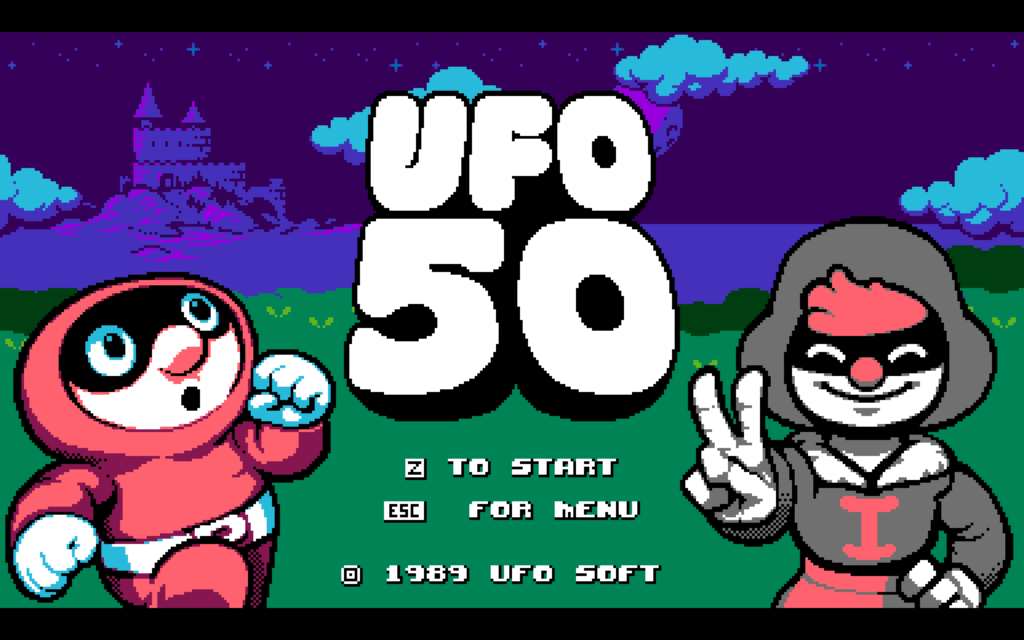
This one isn’t really obscure I think, but it’s amazing, and if I can do my part to help spread the word I’m happy to do so. UFO 50 ($25 on Steam, with other platforms on the way) is a collection of 50 8-bit styled games from Mossmouth, the creator and publisher of Spelunky, although they’re made by all kinds of people.
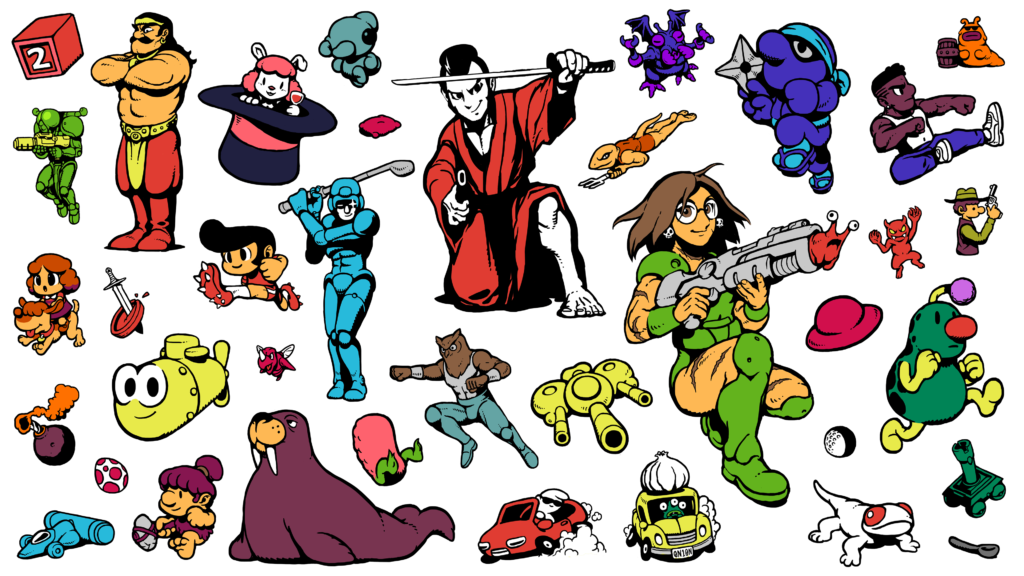
When you hear “50 games,” you might come to think of it as, 50 little games, but that’s not the case. UFO 50 contains 50 full games, including one in the JRPG genre that could take many hours to finish. It seeks to emulate the experience of putting a pirate multicart into a game console, except none of these games are pirated. It’s a super-abundant collection of fun, and what’s more, the word is that there’s not a single dud in the group, there really is something here for everyone.
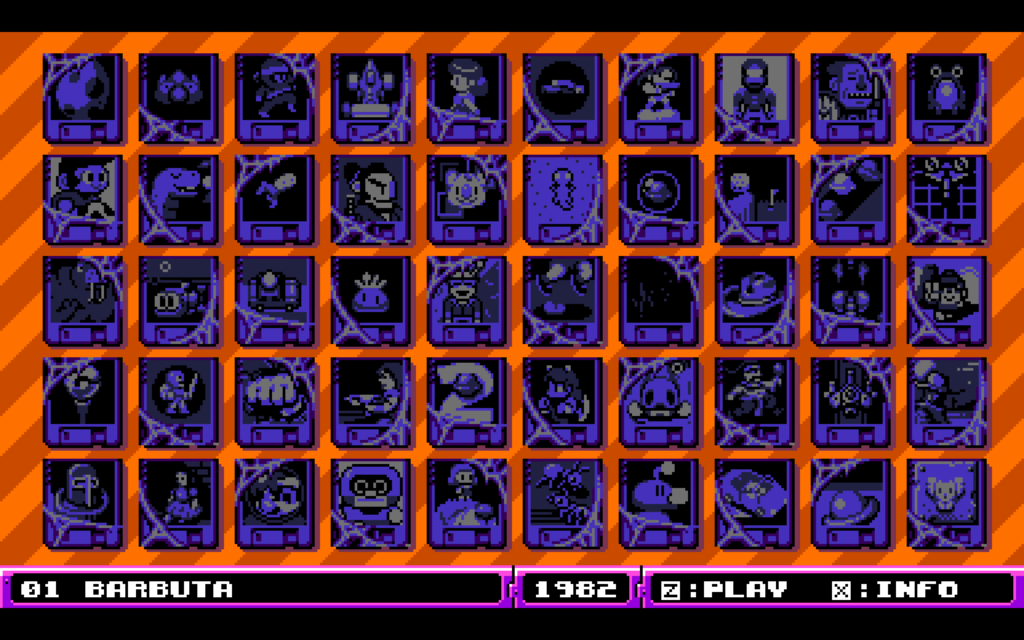
Like with Baldur’s Gate III, there’s so much here that it feels like they might be stretching out what’s expected from a relatively small amount of money. My suggestion is, get it, but don’t feel like everyone has to give you 50 full-sized games for $25 in the future. It’s a one-off, wonderful for what it is, but an anomaly.
With 50 games included, it can be difficult to tell where to start! If you let itt sit on the game selection screen, it’ll play demos of the games, which might give some direction to your exploration. By default, the games are listed according to release date in the collection’s fictional chronology, so generally they’ll get more complex later on in the list. Xanagear reviewed every game in UFO 50, in 50 minutes natch:
I haven’t had the chance to get into any of this yet, but a particular game I want to point to is Valbrace, which is a first-person dungeon exploration game, with Crossed Swords-like action combat!
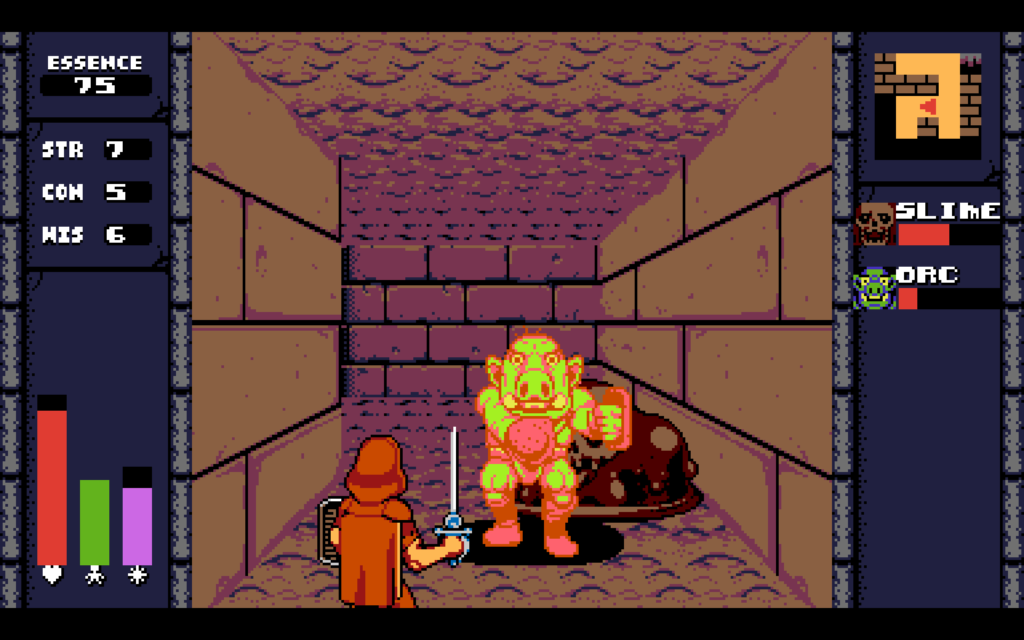
The promised JRPG is Grimstone, which has a western theme, and one of your potential characters (you pick your party at the start) is a dog!
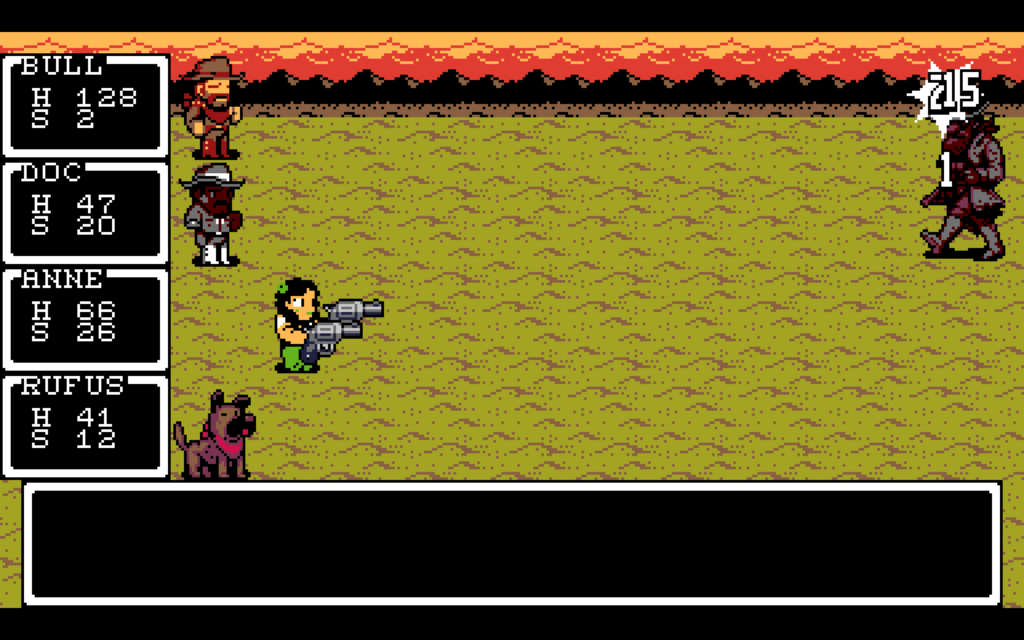
UFO 50 deserves a lot more words than I can give it right now. There may be more to come on it later….
UFO 50 (Steam, $25)
Gamefinds: Make-Ten
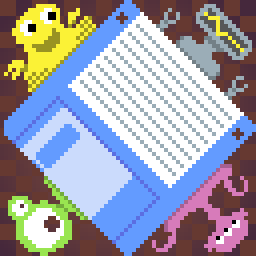
We love it when we find weird and unique indie games to tell you all about! Our alien friends to the left herald these occasions.
It’s another of those games that’s remade in Pico8, and in the process becomes subtly different, not necessarily better, but not worse either. It’s Make-Ten, and it’s free on itch.io.
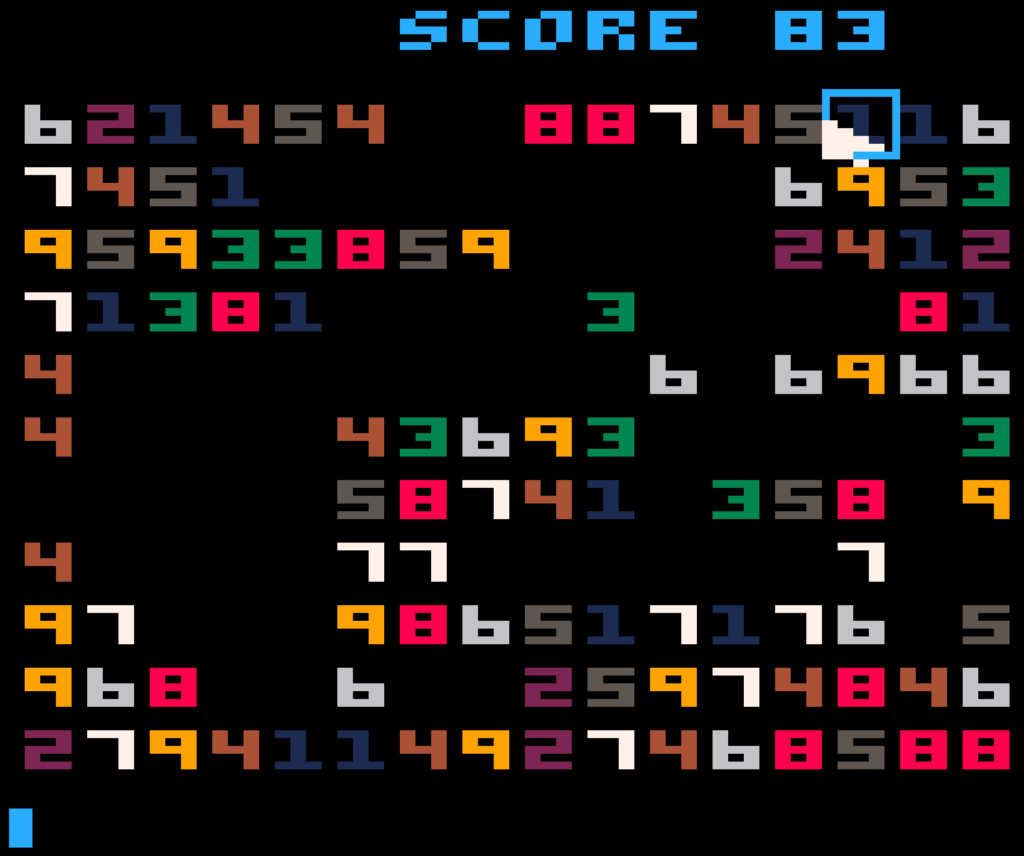
This time it’s not an arcade game. The remake is of a mobile and web game called Fruit Box. I’ve only tried the web version and, in this case, I think the Pico8 version is better. The UI is a lot easier to use for its only action, drawing boxes around numbers. The original uses a generic rectangular box, while the Pico8 version snaps the lines to the number grid, which works much better for me. Also the numbers are colored according to value, which helps readability a lot.
I’m sorry, I should explain what I’m talking about!
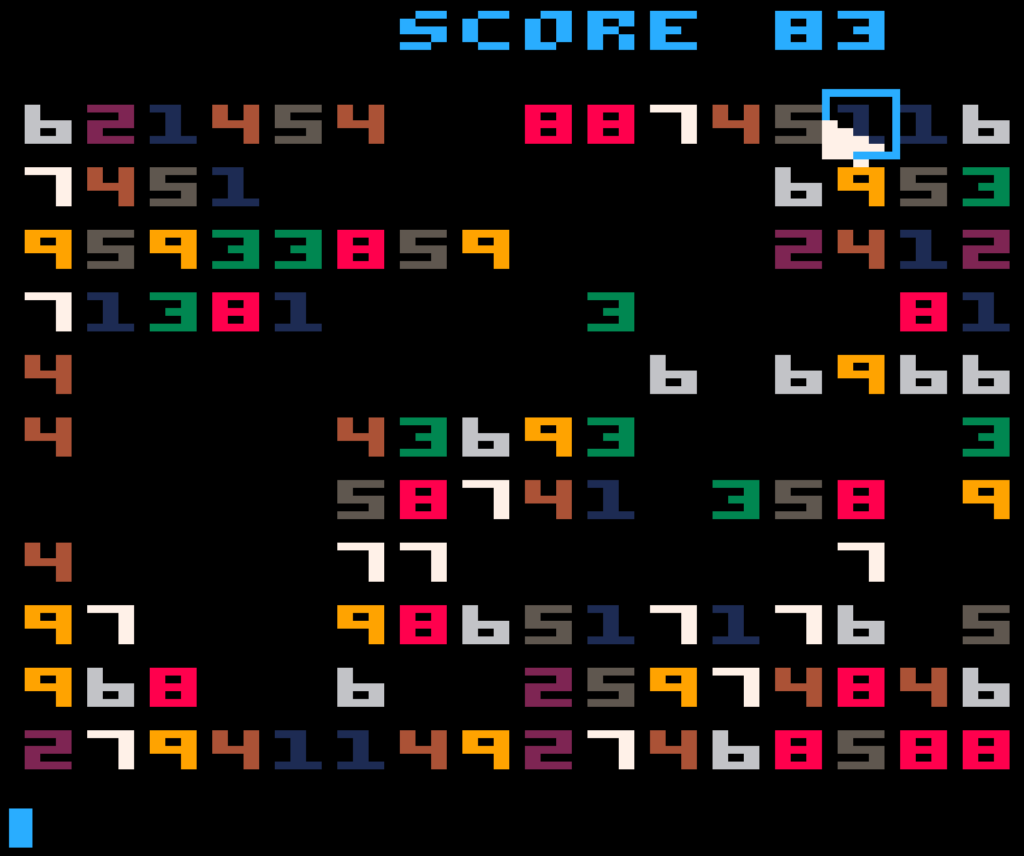
It’s one of those simple yet addicting games. You’re given a random field of digits from 1 to 9. You’re given a couple of minutes to draw rectangles around sets of numbers that up to 10. When you do, you get one point per digit you remove (which is a difference from the original), and those digits disappear from the board.
Obviously, pairs of numbers that add up to 10 are relatively easy to find. Any pair of 5s, for instance, can be immediately cleared. Each game usually starts with clearing away any quick pairs. Removed pairs make space to connect further digits. Empty spaces have no number value, and make it easier to clear more than two numbers at once. Some examples of common larger sets to surround (of course they can be in any order): 4-3-3, 1-2-3-4, 7-1-2, 5-3-2, 6-2-2 and 4-4-2. The tricky part is connecting two numbers in the corners of a box, when other digits get in the way, adding unwanted values to the sum.
The most valuable digit is 1, since they fit into the most possible combinations.
While Make-Ten is not a game for perfectionists, as it’s probable that most fields cannot be fully cleared, the game does let you keep playing after time concludes, which is an advantage it has over Fruit Box. It doesn’t count points after the time bar runs out, but it can be interesting to see how much of the board you can complete.
Make-Ten is really simple and has very little fuss about it. It plays quickly, and then it’s over. It’s a nice game for quick sessions. It was written in 500 characters of code, and doesn’t offer any progression or metagame. After two minutes, which begin the moment the game starts, there isn’t even a prompt to play again. To have another go, press Enter and choose to Reset Cart, or just close the window if you’re done.
Make-Ten (itch.io, by pancelor, $0)
Sundry Sunday: The Untitled Goose Programme

Sundry Sunday is our weekly feature of fun gaming culture finds and videos, from across the years and even decades.
It isn’t always easy finding things for this weekly feature. Sometimes it’s backed up a month, sometimes though something gets scheduled just a couple of days after it premieres, and I have to scrape the barrel a bit. But not this time. Oh no.
Remember Untitled Goose Game? Seven years ago I made a Metafilter post about the first WIP promo video, but the game itself is only five years old. Since its 2019 release, there’s been celebratory essays, philosophy essays, desktop toys, a very popular “review” from videogamedunkey, and more wonderful articles and reviews from, among other places, the New Yorker and The Guardian.
Back in 2021, developer House House considered making an animated series about the Goose and its village. Nothing came of it, but they did make a four-minute proof-of-concept animation, and it’s wonderful. Please allow your day to be brightened, and moistened, once again, by the Goose:
A Look At Beta Versions of the Wii Channels
An internal Nintendo metaphor for the Wii’s UI was “more channels for the TV.” It’s a particularly Old Dad idea for the Wii really, as even at that time broadcast TV was beginning to decline in popularity, but it may have made more sense in Nintendo’s home territory.
The experiences of these channels, the Mii Channel, the News Channel, the Weather Channel, the Shop Channel and the like, are receding in memory, although there are fan efforts to revive them and connect them to new information sources. But at the other end of their development life, of their pre-release development very little has ever been known. Early Wiis had stubs in their place, that only directed the user to installing a launch-day update. (I experienced this myself! I drove 140 miles in order to wait in a line for a Wii on its launch day, November 19, 2006. I’m objectively insane.)
Those stubs weren’t the true original versions of the Wii Channels, they had been in development within Nintendo for some time. Those development versions of the Wii software have never been leaked outside the company, but there exists footage of them from various sources. Bjohn on Youtube has compiled what we know about the development Wii Channels into a 21-minute video. Here it is:
There’s a fair amount there, including early versions of the Internet Channel and early evidence of plans to include DVD support. (The Wii has a fully-operational DVD drive, but to avoid playing a license fee to the DVD Consortium it cannot play DVDs without hacks.)
Beta Wii Channels! (Bjohn on Youtube, 21 minutes)
Why Hasn’t Nintendo Adopted Achievements?
Some years back, as a casual remark in a place that I don’t remember, I said that Nintendo has a problem with using ideas that they didn’t come up with in-house. “Not Invented Here Syndrome” I may have phrased it. I forget the context too. It may have had to do with their refusal to use rollback code in internet multiplayer gaming, but there are other time where it’s seemed that there are things that are solved problems everywhere else, that Nintendo still has trouble with.
One of these things has been Achievements, a platform-recognized system where a player’s accomplishments are registered and stored, that can be observed outside the game and shared with others. Achievements began with the Xbox 360, and were soon after implemented by Valve in Steam, as “Awards” by Sony in the Playstation ecosystem, and even by fans playing games and romhacks in emulators as RetroAchievements.
One company that’s always avoided using them, despite being the oldest major console publisher still in operation, is Nintendo. They’ve avoided any cross-game recognition of skill or accomplishment, even though they’ve come close multiple times. Several of their games offer in-game recognition of accomplishments, in the form of “Stamps” or “Trophies” or “Stickers.” Super Mario Galaxy would post images on the Wii message board when the game was completed. When Miiverse was a thing, players could share messages with earned stamps from some games. But none of these systems had sharing outside of their respective games or individual consoles. None promises any account-level recognition.
Why is this? Nintendo’s games are enormously popular, and many players have rued the absence of any support for an achievement system, and to this day show no signs of starting one. Why? It seems like such an obvious thing. Everyone else does it. It would probably heap more value upon Nintendo’s bottom line, so why not?
As it turns out, it goes back to their Not Invented Here Syndrome. The person at whose fee the blame trail ends is unknown, but the evidence is there, in an episode of the Kit and Krysta show, available as a podcast with excerpts on Youtube. Hosted by two former Ninendo employees, who ran a periodic show that was promoted for a time on the Switch’s News channel, they tell the story of what happened when another employee brought up the possibility of offering something like achievements at a meeting. The recounting is in this Youtube video (4 1/2 minutes), with the important bit starting around 2:07:
From the transcript (there are some minor errors):
“I remember I think you were in this meeting too this was like a pre E3
meeting somebody pretty high ranking got absolutely eviscerated in a meeting by another person who is very high ranking because they were they were suggesting doing something things in the style of micros why don’t why don’t we do like Xbox does this thing really well why don’t we do that and this was like a really like packed full meeting I’m and this person was like a senior director this person got eviscerated in that meeting of like we do things our way this is the Nintendo way we cannot simply follow the path of what Xbox like it was just like it went on and on I was like it was like a 20 minute lecture […]
so there you go yeah they definitely don’t want to do like copy their competitors but they also have that sense of like no everyone’s equal we’re equal opportunist gamers right I think they also see this as like this is not a pure way of experiencing a game like you rushing through it or like only focusing on this thing like that’s not how you should play a game I kind of agree with that cuz we did some dumb stuff get those achievements that’s true and then they also like want you to play that game in a very specific way so they don’t want you to use a different system to like do it your way because they want they’ve built this game specifically in the way that they think that you’ll enjoy it the most and they’re going to want you to do that[…]“

